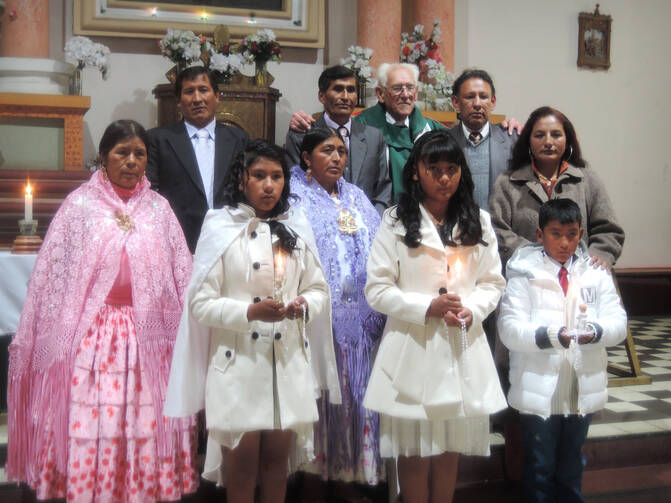Belfries and spires poke the sky in this ramshackle city of impromptu developments, rutted roads and brick buildings, billed by locals as one of the highest in the world at more than 13,000 feet above sea level.
In the Villa Adela neighborhood, an onion dome towers over the Cuerpo de Cristo parish—easily visible from the runway of the nearby international airport, where Pope Francis is scheduled to land July 8 for a brief visit to El Alto and nearby La Paz.
The church towers were "what people wanted," said Father Sebastian Obermaier, the parish's German pastor and the man responsible for constructing churches across El Alto. "The people said, 'Father, we want a nice church. A nice church is older.' So I looked for designs that the people wanted."
Father Obermaier, 80, arrived in El Alto 37 years ago, when it was a settlement with few services, five priests -- all foreign -- and 80,000 souls, mostly indigenous Aymara who had abandoned subsistence agriculture in search of improved economic opportunities.
As the city population mushroomed to roughly 1 million people on the Andean altiplano, Father Obermaier started building churches, putting a technical drawing course from secondary school to use.
"I was pretty naive at first," he said between baptisms at one of the parishes he built.
But Father Obermaier persisted and constructed more churches than he can remember. He believed buildings were vital for attracting and retaining new residents, along with offering an identity for impromptu neighborhoods.
Without a building, he said, "Two people will show up." But, "If I build a church on the corner I'll have 250 people; this is the issue."
A missionary priest originally sent by the Archdiocese of Munich -- now-retired Pope Benedict XVI was his archbishop for a time -- Father Obermaier never planned on putting such an emphasis on church building. He figured, "I'm going to build a community of God, not temples."
His superiors showed skepticism and convinced him otherwise. "(They) said, 'You're crazy. Where are people going to go?" he recalled. "Construct first, then you see the impact of having a temple, and having a tower."
His current superior, Bishop Eugenio Scarpellini of El Alto, said the priest's penchant from construction is based in the European experience.
"What is his idea? In Europe, churches have always been landmarks in their communities. Every town has a church in the center," said Bishop Scarpellini, who came to El Alto from Italy. "He says, 'When a new urban development is built, the people who are Catholic will come and ask for me.'"
Father Obermaier, who has snowy white hair, bright blue eyes and seemingly endless energy -- "I'm 80 years old, but feel like a young man of 20," he said -- is best known for his buildings. But he's built an expansive social ministry, too, managed through the Fundacion Cuerpo de Cristo, which has opened youth centers, schools, health clinics. He started a Catholic TV station, Channel 57, which collects more than 50,000 toys in its annual Christmas telethon.
It's an example of how the Catholic Church has historically provided services such as health and education in areas where the state has been absent.
He has criticized President Evo Morales, who clashed with church leaders and changed the constitution to make Bolivia a secular state, but also have been called to mediate in civic disputes, such as conflicts between public transport drivers and the local authorities.
And in preparation for the papal visit, he performed collective baptisms and confirmations.
"He is a priest who rises very early, works well into the night and gets involved in everything," said Bishop Scarpellini. "He's a very austere man. He will not accept any luxury, not even a glass of wine with a meal. He would drink water instead."
Father Obermaier expressed bemusement with the attention and takes no credit for any accomplishments, saying the church is still small and not adequately serving a city that continues to absorb newcomers.
"Parishes are big," he said. "A parish in Germany has maybe 6,000 (parishioners). My parish has 80,000."
Still, Father Obermaier sees signs of hope. Incomes have increased in El Alto over the past decade and signs of wealth are visible, most notably the multi-color, multi-story "new Andean architecture" buildings.
He now has a vicar at his parish for the first time.
"It's good because an old fellow learns from the young," he said. "A young priest has new ideas, another dynamic. It's positive to have some youth."
He said he also is encouraged by the number of Bolivian-born priests, who now make up the majority of clergy in the diocese.
"We now we have 70 priests of those priests, maybe 13 are foreign priests," he said. "They don't need me here. Times have totally changed."








